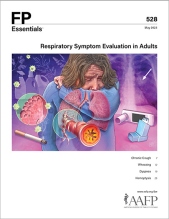
These key learning points summarize the consensus- and evidence-based recommendations included in this edition. The sources listed here for each statement recommend that physicians perform or implement these actions directly in a clinical setting.
1. In the initial evaluation of patients with chronic cough, assess for red flag signs and symptoms suggestive of a life-threatening diagnosis, including hemoptysis, voice changes, trouble swallowing, dyspnea at rest, stridor, fever, weight loss or gain, leg edema, tachypnea, and a history of tobacco use.
Strength of Evidence: SORT C
Sources: Chest, Dtsch Arztebl Int, references 19 and 22
Websites: https://www.ncbi.nlm.nih.gov/pmc/articles/PMC4694189/;
https://www.mayoclinicproceedings.org/article/S0025-6196(13)00722-2/fulltext
2. For patients with chronic refractory cough, prescribe a trial of pregabalin, gabapentin, or speech therapy and consider referral to a pulmonologist or otolaryngologist.
Strength of Evidence: SORT C
Source: Am Fam Physician, reference 22
Website: https://www.aafp.org/pubs/afp/issues/2017/1101/p575.html
Subscribe
From $350- Immediate, unlimited access to FP Essentials content
- 60 CME credits/year
- AAFP app access
- Print delivery available
Edition Access
$44- Immediate, unlimited access to this edition's content
- 5 CME credits
- AAFP app access
- Print delivery available
